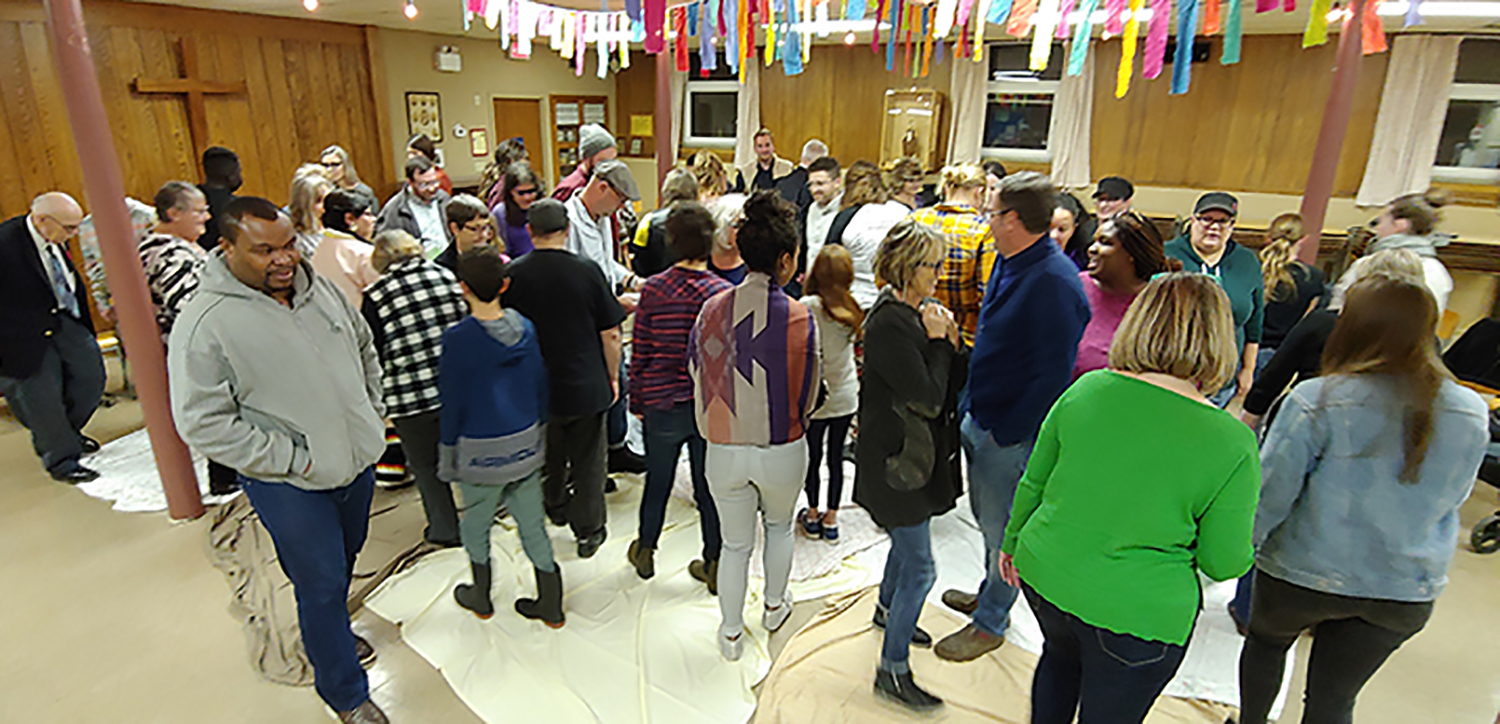
Looking back at the events of Treaty Recognition Week organized by Reconciling Circle, a group initiated through Lutheran and Anglican conversations in Brantford
By Rev. Peter Mogk
How do you like the term “ambassadors of reconciliation?”
Although borrowed from the two volumes by Ched Myers and Elaine Enns, this may describe part of what is happening in the Treaties Recognition Week (TRW) activities of our Reconciling Circle; an evolving circle of intention initiated through Lutheran and Anglican conversations in Brantford that now recognizes participation across Southwestern Ontario.
This is a learning journey that offers whispers of growth and hints of reconciliation possibilities. Such hopefulness is rooted in observations and comments shared by participants.
Increasing diversity in group makeup, range of experience and interest expressed, as well as expansion toward two hundred engaged persons suggest that some new life is being nurtured. As “prisoners of hope”, we are praying that these precious times together are facilitating two outcomes: 1) encouraging ambassadors of reconciliation; and 2) pointing toward new horizons of relationship and justice.
There were signs of this movement in gathering at St. Mark’s Anglican, Brantford, to view the film “The Longhouse People” and discuss personal observations through the life experience of Barry Hill. One of these insights was reinforced another evening at Faith Lutheran, Brantford, where exploring the “doctrine of discovery” continued to help us recognize that there is a world of difference between a culture and a civilization.
Musing on this distinction continues to present the invitation to consider this fact of history: millions of people occupied the Americas for numberless generations and had greater wisdom of agricultural methods than our ancestors who came to these immigrant shores; also wiser than contemporary corporate mono-cultural schemes that feed shareholders. We are casting our votes for learning from Indigenous civilizations, rather than buying into corporate cultures that enslave as surely as pharaoh.
Affirming that ambassadors work in the meeting place between realms, we dare to ask: “How can we believe that civilizations flourished in the New World? What other conclusion can we reach, when we accept the historical record that Meso-American residents cultivated more than five thousand varieties of corn, when Columbus mistakenly reported that he had “discovered” India and named the residents “Indians?” What other agreement can we reach, when we accept the evidence that Inca people tended some three thousand varieties of potatoes to ensure a reliable food supply during adverse conditions?”
There is powerful wisdom in gathering in a sharing circle to open perceptions of destruction of Indigenous civilizations, loss of millions of lives, theft of previously occupied lands, and twisted thinking that turned people different than us into disposable nobodies. Suchlearning demands patience and time. This is as true of movies and sharing circles as it is of the profoundly moving Blanket Exercise that was developed jointly twenty years ago by KAIROS and Indigenous representatives.

Blanket Exercise at St. John’s Lutheran, Hamilton
With our focus on treaties and the destructive history of treaty abuses, we are drawn to recognize that treaty formation is akin to covenant development. We are given rich opportunities to live into the implications of both treaty and covenant being founded in both open presence and relationship; not legal technicalities and behavioural impositions. This summons to connect with the broken edges of history predictably engaged everyone participating in the Blanket Exercise at St. John’s Lutheran, Hamilton.
We continued to enter into new rooms of exploration and truth, when an age varied group gathered in Her Majesty’s Royal Chapel of the Mohawks under Dorothy Patterson’s patient skill and guidance. How rich and satisfying to do the intricate work of crafting medicine pouches and learning history of their contents.
Rick Hill’s keynote presentation on “Treaties Affecting the Haldimand Tract” ushered an enthusiastic group into the history of wampum belts, their fabrication, symbolic meaning, and practical guidance into respectful treaty relationships; relationships that are refreshed in open trusting dialogue that surfaces both the intent and the lived experience.
As usual, all participants in our TRW activities were offered copies of UNDRIP (United Nations Declaration of the Rights of Indigenous Peoples). Reading here directs attention to the five little words (should we say stumbling stones?) that were ignored politically and led to the launch of Idle No More: “free, prior, and informed consent.” These words remind one of the five smooth stones that David gathered in his approach to the vision- impaired Goliath. We are left to ponder how can these five words expose our complicity in messing up the lives of so many people around this Earth; usually Indigenous.
As we begin the work of looking toward TRW 2019 (3 – 9 November), we move the intention of Ontario’s Bill 207 (the Treaties Recognition Week Act of 2016) beyond school classrooms into the adult life experience of potential ambassadors of reconciliation. This focus on our treaties is being supported financially by the Diocese of Huron, Anglican Church of Canada, the Eastern Synod, Evangelical Lutheran Church in Canada, and others. Many individual donations affirm our working relationship with the Woodland Cultural Centre where individual gifts http://woodlandculturalcentre.ca/ are directed to the Save the Evidence Campaign to restore this first residential school in Canada.
Our purpose as Reconciling Circle is to provide opportunities for shared learning and for building bridges of relationship that promote respect and reconciliation between Indigenous and non-Indigenous peoples with particular focus on Treaties Recognition Week.
Rev. Peter Mogk is a retired Lutheran pastor resident in Brantford and a member of Reconciling Circle.
Photos: Chun Zhang
Featured photo: More than 40 people came to Woodland Cultural Center to listen to Rick Hill’s take on respectful treaty relationships. Rick talked about history of wampun belts, their fabrication and symbolic meaning.
(The term “ambassadors of reconciliation” is borrowed from Ched Myers’ and Elaine Enns’ volumes “Ambassadors of Reconciliation: New Testament Reflections on Restorative Justice and Peacemaking” and “Ambassadors of Reconciliation: Diverse Christian Practices of Restorative Justice and Peacemaking”.)